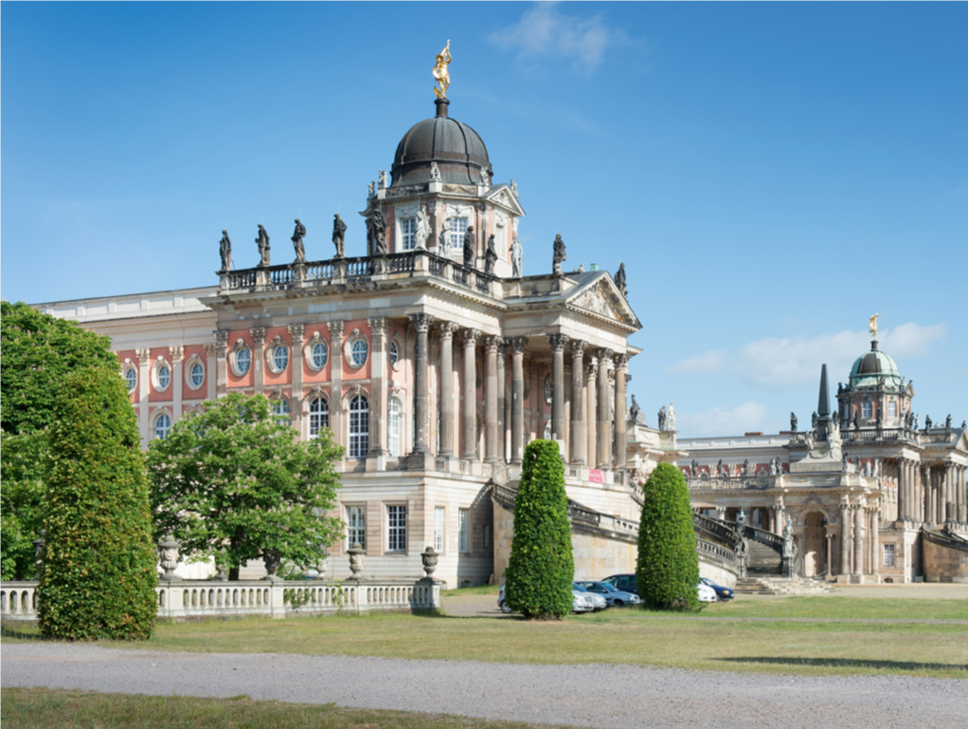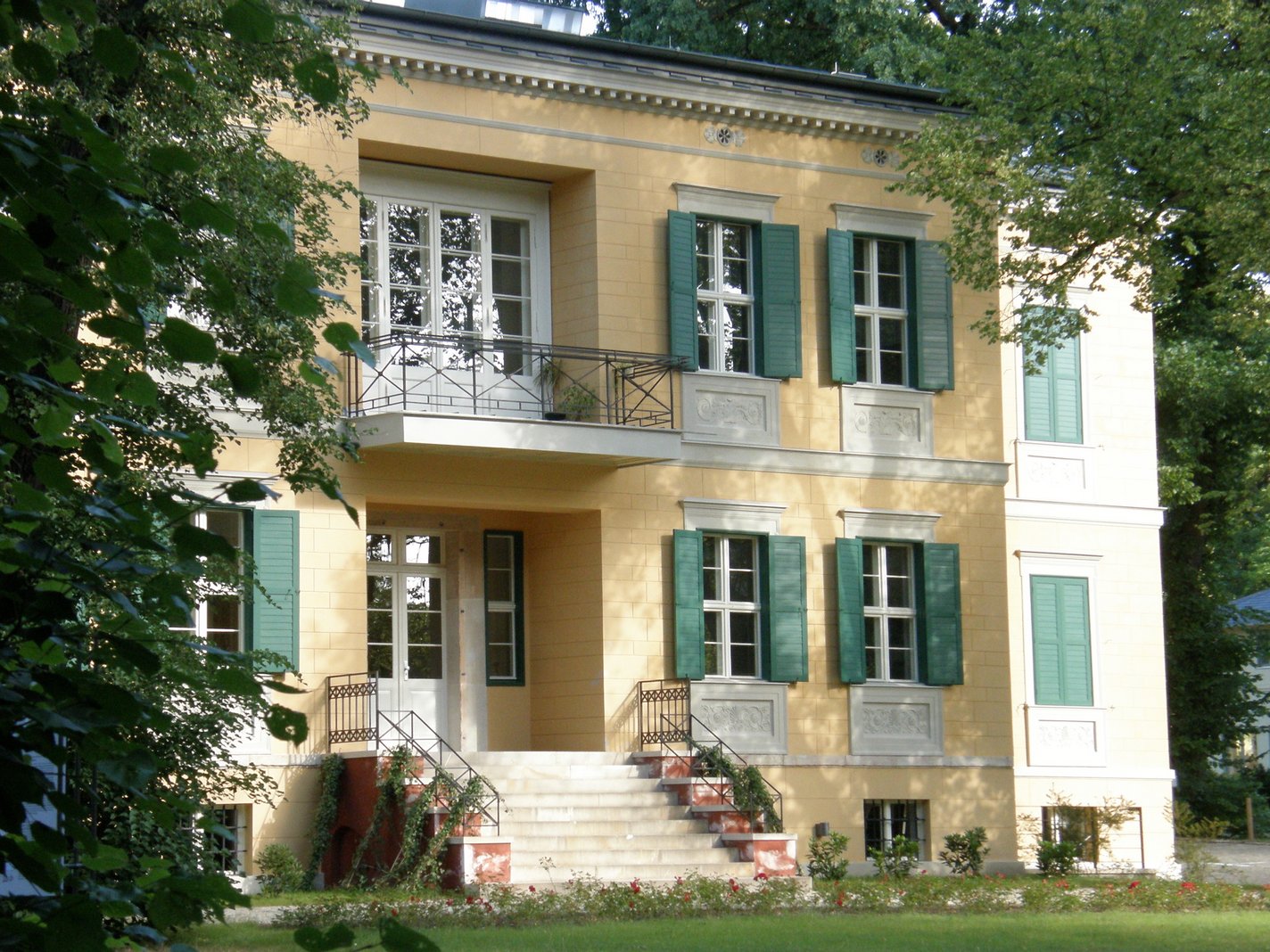fontane.200
The Theodor Fontane Archive and the Fontane Year
With innovative projects, new digital services, and an international congress on the topic of Fontane’s Media (1819-2019), the Theodor Fontane Archive in the anniversary year fontane.200 is focusing attention on both the modernity of Fontane as a media worker and the potential of digitization for cultural heritage institutions. A diverse cultural program at Villa Quandt on Potsdam’s Pfingstberg also invites visitors to discover new facets of Theodor Fontane in readings, talks, guided tours, and discussions.
The writings, works, letters, and records of Theodor Fontane were created in a remarkably dynamic media environment, characterized both by the rise of the periodical press as the leading medium and the constant growth of media imagery, as well as by the triumphant advance of new media such as photography and telegraphy. In the face of the current media upheavals, in the anniversary year 2019 the Theodor-Fontane-Archiv looks back on the complex media world of the 19th century, in which Fontane moved as a highly professional actor. At the same time, it is important to reflect that everything we know about Fontane today is conditioned by those media that bear witness to Fontane’s work and influence: the basis for Fontane’s presence in our time is created by historical prints, precious manuscripts, paintings and portrait photographs, as well as plays, films, exhibitions and, increasingly, digital media.
With this double perspective, which takes into account Fontane as a media user as well as the media staging and reception of Fontane in the past and today, the Theodor Fontane Archive discusses fundamental questions in the anniversary year: How did media shape Fontane’s authorship? What does it mean to act as an author in a differentiated and economized media system? How does literature reflect contemporary media environments? How does the media - from photography to film to social media - contribute to the image of authors?
![[Translate to en:] Logo von fontane.200](/fileadmin/_processed_/f/3/csm_2018-12-20_logo_fontane.200_weiss_3e6573f43a.png)
Numerous program partners from the fields of culture, education and science will present a wide-ranging program under the title fontane.200 from the 30th of March, 2019 to the 200th anniversary of Theodor Fontane’s birth on the 30th of December, 2019. The Fontane Year is conceived and coordinated by the »fontane.200/Büro«, a cooperation between the »Brandenburgischen Gesellschaft für Kultur und Geschichte GmbH« and the University of Potsdam.
Last but not least, the Theodor Fontane Archive is also reflecting on its own role as a cultural heritage institution: How does one care for and research an author in the digital age? The Theodor Fontane Archive is addressing these and other questions in the context of an international congress and by implementing a long-term digital strategy.
As a highlight of the scientific program of fontane.200, the Theodor-Fontane-Archiv organized an international congress in cooperation with the Faculty of Philosophy of the University of Potsdam on the topic of Fontane’s Media (1819-2019). From the 13th to the 16th of June, 2019, scholars from Germany, Austria, Switzerland, England, Sweden, Russia, and the USA discussed the significance of media for Theodor Fontane’s literary as well as journalistic work in more than 50 lectures. Additionally, in more than 20 panels we reflected on those (digital) media in which we encounter Fontane today. The main academic program opened on Thursday afternoon, the 13th of June, 2019, with a ceremonial kick-off event. The opening keynote entitled Theodor Fontane: Communicating, Producing, and Publishing in Networked Media was given by the literature and media scholar Rolf Parr.
The sections were, among others, devoted to the following topics: »Fontane’s Social Media: Letter, Salon, Association«, »Fontane’s Educational and Ego Media: Diary, Autobiography«, »Media as Theme and Actor in Fontane’s Novels«, »Fontane as Magazine Writer«, »Fontane’s Writing Workshop«, »Fontane and the Journalistic Correspondence«, »Fontane’s Visual Worlds - Pictorial Worlds of Fontane«, and »Fontane in the Digital Media«.
The program of the congress included two prominent evening events: On Friday, the 14th of June, 2019, a panel discussion with Fontane biographers Iwan Michelangelo D’Aprile, Regina Dieterle, and Hans Dieter Zimmermann discussed biography as a popular medium for the reception of the classics. On Saturday, the 15th of June, 2019, a panel discussion with writer Kathrin Röggla and Georg Büchner Prize winner Marcel Beyer focused on current techniques of note-taking based on Fontane’s notebooks. The congress was also be accompanied by numerous presentations and debate forums, such as a ›bar camp‹ run by students from the Faculty of Philosophy at the University of Potsdam, which examined Fontane from an interdisciplinary perspective, and a ›Young Fontane Researchers Forum‹, in which young academics reported on their research projects on Fontane.
Further information
The program planning was the responsibility of a program committee of national and international experts, headed by Prof. Dr. Peer Trilcke. The congress was sponsored by the »Ministerium für Wissenschaft, Forschung und Kultur des Landes Brandenburg« and by the University of Potsdam. It was organized in cooperation with the Theodor Fontane Society.
Digital strategy of the Theodor Fontane Archive
With the launch of its own website, the Fontane Archive completes the first phase of its long-term digital strategy in the anniversary year and provides scholars and interested parties with expanded online services on Fontane. The new website will not only serve as an information and communication platform, but will also successively present the manuscript holdings of the Fontane Archive, which have already been fully digitized. As a special collection of particular importance, Fontane’s entire surviving reference library will be made available in the form of an interactive visualization created in a research project with Marian Dörk, Professor of Information Visualization at the University of Applied Sciences Potsdam. The most important publication organ and an essential aid and research tool for Fontane research will be digitally accessible free of charge in the future in the form of the academic bi-annual Fontane Blätter, which has been published by the Fontane Archive since 1965, and the Theodor Fontane Bibliography by Wolfgang Rasch, which was published in 2006. The launch of the website, which was developed together with the Berlin web agency cosmoblonde, took place during an evening event on Thursday, the 7th of March, 2019, at Villa Quandt.
Cultural education programs: Events and guided tours
As a »Kultureller Gedächtnisort von nationaler Bedeutung« (Cultural Memorial Site of National Importance), the Theodor Fontane Archive always cultivated an interest in Fontane’s work and influence. In its anniversary year, the Fontane Archive is once again attracting visitors to Villa Quandt on Potsdam’s Pfingstberg with a particularly high-caliber and varied program of events, and is also a guest at some of its partners’ venues, such as the »Haus der Brandenburgisch-Preußischen Geschichte« (House of Brandenburg-Prussian History) and the »Deutsche Oper Berlin« (German Opera Berlin). The successful series »Neues Altes von Fontane«, in which archive staff present the most remarkable new acquisitions of the past year and current projects of the archive, will be continued. The archive doors will also be open to the curious on the »Internationalen Museumstag« ( International Museum Day) and, this year for the first time, on UNESCO Day.
As part of the theme year fontane.200/Spuren, proclaimed by »Kulturland Brandenburg«, the Theodor Fontane Archive is offering a special Fontane Year guided tour for Potsdam’s Villa Quandt in 2019. Visitors can experience the abundance and diversity of Fontane’s ›traces‹ in the archive. In addition to thousands of manuscripts and historical prints, these include paintings, drawings and photographs, a large part of the surviving reference library and life documents of all kinds, such as pharmacy products or diaries and account books. At the same time, the guided tour vividly depicts the eventful history of these ›traces‹ and their collecting and reading. For more than eighty years, the Fontane Archive has been collecting and maintaining a broad spectrum of Fontane’s reception and transmission testimonies: from the transcript volumes that are central to the history of the Fontane estate, to the reception in the press and academia, to scholars’ estates from the filed of Fontane research.



